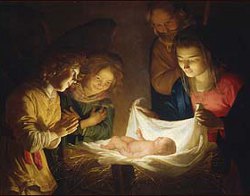32 Story High Rise Cemetery in Brazil
Body
Discussion
Christopher Hitchens Has Died
Discussion
Christmas Marvel

Seven hundred years before Christ (i.e., Messiah) was born, the prophet Isaiah was told that He would be one person with two natures—divine and human.
At a time of great crisis for Israel, the house of David was given a great promise. “Then he said, ‘Hear now, O house of David! Is it a small thing for you to weary men, but will you weary my God also? Therefore the Lord Himself will give you a sign: Behold, the virgin shall conceive and bear a Son [i.e., fully human], and shall call His name Immanuel [i.e., God with us, fully divine]’” (Isa. 7:13-14). In the very next chapter, the prophet is told that the God of Israel is “Immanuel” (Isa. 8:8; cf. 8:10).
But how could a virgin have a child? That was the urgent question that Mary asked Gabriel, the messenger-angel sent from God: “How can this be, since I do not know a man?” (Luke 1:34). The answer was astounding, and is recorded by Luke, “the beloved physician” (Col. 4:14): “And the angel answered and said to her, ‘The Holy Spirit [i.e., the third person of the triune God] will come upon you, and the power of the Highest will overshadow you; therefore, also, that Holy One who is to be born will be called the Son of God…. For with God nothing will be impossible’ ” (Luke 1:35-37).
Please note here the ultimate marvel: the reason why her child would be “holy” (i.e., without a sin nature) is not because she was holy (for Mary confessed her need of a Savior—Luke 1:47; cf. 11:27, 28; 18:19), but because the Holy Spirit would “come upon” her and “overshadow” her. The stupendous miracle of the incarnation (i.e., a divine person adding a true human nature to His personhood without becoming two persons) was essential for our salvation. He was not just a man—not even a sinless man (like Adam before his fall)—but one person who was both God and man who was thus fully capable of paying for the sins of the whole world upon the cross. “For in Him dwells all the fullness of the Godhead bodily; and you are complete in Him, who is the head of all principality and power” (Col. 2:9, 10).
Discussion